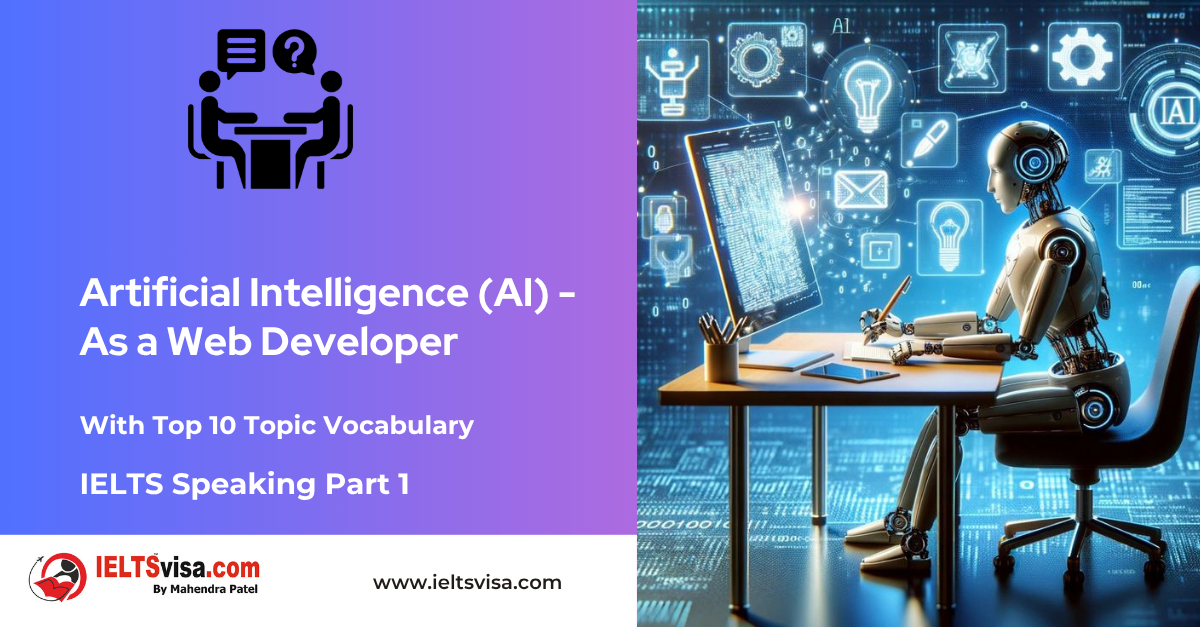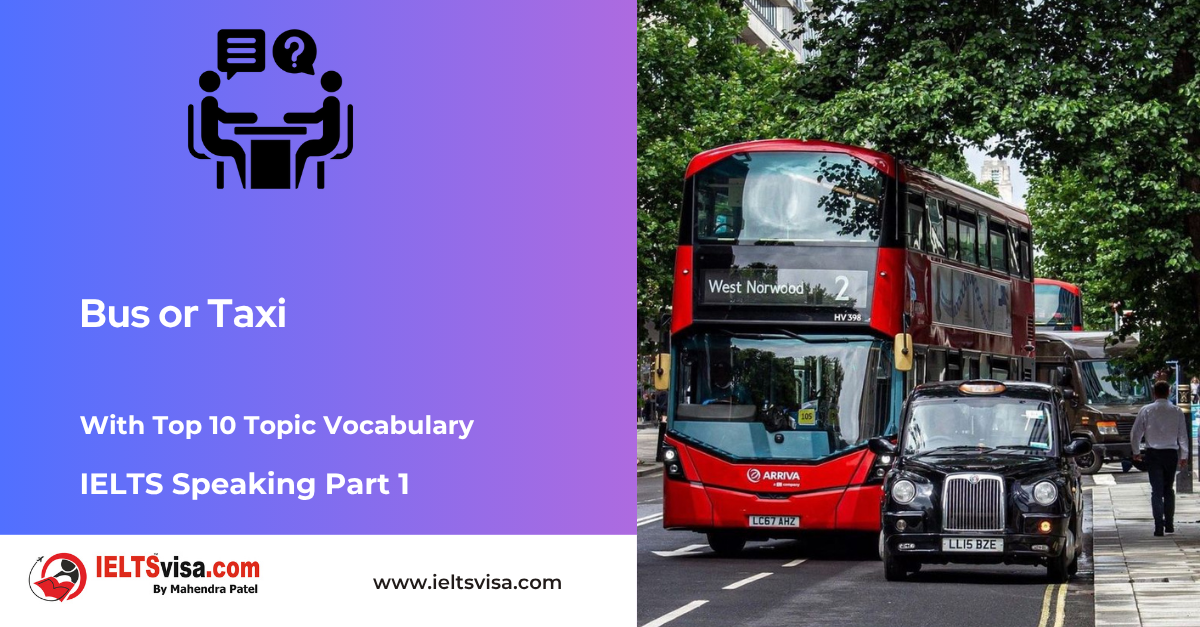IELTS Speaking Part 1 – Artificial Intelligence (AI) As a Web Developer
IELTS Speaking Practice
IELTS Speaking Part 1 – Artificial
Intelligence (AI) As a Web Developer .
Examiner: How is AI changing the field of web development?
Candidate: AI is revolutionizing web development by automating tasks like code generation, enhancing user experience with personalized content, and improving website performance through advanced analytics.
Examiner: Do you use AI tools in your web development projects?
Candidate: I often use AI-powered tools such as chatbots for customer service, predictive analytics for user behaviour, and automated testing tools to ensure code quality.
Examiner: What are the benefits of integrating AI into web development?
Candidate: Integrating AI can enhance user experience, increase efficiency, provide personalized content, and offer valuable insights through data analysis.
Examiner: Can you give an example of an AI tool that you find useful?
Candidate: One useful AI tool is TensorFlow, which helps in developing machine learning models that can be integrated into web applications for predictive analytics and other intelligent features. Besides this, ChatGBT.ai and Claude.ai are helpful for the code generation.
Examiner: How does AI improve user experience on websites?
Candidate: AI improves user experience by personalizing content, offering intelligent search features, and providing real-time customer support through chatbots.
Examiner: Do you think AI can replace web developers in the future?
Candidate: While AI can automate many tasks, it can’t replace the creativity, problem-solving skills, and human insight that web developers bring to projects. AI is a tool to enhance, not replace, our work.
Examiner: How do you stay updated with AI advancements in web development?
Candidate: I stay updated by following tech blogs, participating in webinars and online courses, and experimenting with the latest AI tools and frameworks.
Examiner: What challenges do you face when integrating AI into web development?
Candidate: Challenges include managing the complexity of AI models, ensuring data privacy and security, and integrating AI seamlessly with existing systems.
Examiner: How do you ensure your AI models are effective in web development?
Candidate: I ensure effectiveness by continuously training and testing models with relevant data, monitoring their performance and making necessary adjustments based on user feedback and analytics.
Examiner: Can AI help in optimizing website performance?
Candidate: Absolutely! AI can analyze user behaviour, predict traffic patterns, and suggest optimizations to improve loading times, resource usage, and overall performance.
Examiner: Do clients typically understand the benefits of AI in web development?
Candidate: Some clients do, but others may need education on the benefits. I often explain how AI can enhance their website’s functionality, user engagement, and business growth.
Examiner: How do you handle data privacy concerns with AI in web development?
Candidate: I handle data privacy by implementing strong security measures, following best practices for data encryption, and ensuring compliance with data protection regulations.
Examiner: What AI advancements are you most excited about for the future of web development?
Candidate: I’m excited about advancements in natural language processing for better user interactions, improved predictive analytics, and more sophisticated AI-driven design tools.
Examiner: How does AI assist in front-end and back-end development?
Candidate: For front-end development, AI can automate design processes and improve user interface interactions. AI can optimize server operations, manage databases, and enhance security protocols for back-end development.
Examiner:What advice would you give to someone new to using AI in web development?
Candidate: Start by learning the basics of machine learning and AI, experiment with simple AI tools and frameworks, and gradually integrate AI into your projects to see how it can enhance your development process.
Top 10 Topic Vocabulary for“Artificial
Intelligence (AI) As a Web Developer“
|
Vocabulary |
Type |
Meaning |
Synonyms |
Antonyms |
Word Family |
Example Sentences |
|
Revolutionize |
Verb |
Cause a significant or complete change |
transform, radically alter, revamp |
revolution |
AI is revolutionizing web development. |
|
|
Personalized |
Adjective |
Tailored to a specific individual or group |
customized, individualized, bespoke |
standardized, generic, common |
personalization |
AI can personalize content on websites. |
|
Analytics |
Noun |
The detailed study of data |
data analysis, data science, business intelligence |
analyze |
AI provides advanced analytics for website performance. |
|
|
Predictive analytics |
Noun |
The use of data to predict future outcomes |
forecasting, data mining, predictive modelling |
analytics |
AI uses predictive analytics to understand user behaviour. |
|
|
Seamlessly |
Adverb |
In a smooth and effortless way |
smoothly, flawlessly, effortlessly |
clumsily, awkwardly, disjointedly |
seamless |
AI integrates seamlessly with existing systems. |
|
Model |
Noun |
A computer program that is trained on data to make predictions or decisions |
algorithm, framework, system |
model |
TensorFlow helps develop machine learning models. |
|
|
Compliance |
Noun |
The act of obeying rules or standards |
adherence, conformity, observance |
non-compliance, defiance, disregard |
comply |
We ensure compliance with data protection regulations. |
|
Advancements |
Noun |
Progress or development made in a particular field |
improvements, breakthroughs, innovations |
setbacks, regressions, declines |
advance |
I’m excited about advancements in natural language processing. |
|
Front-end development |
Noun |
The part of web development concerned with the user interface and user experience |
client-side development, presentation layer |
back-end development |
AI can automate front-end design processes. |
|
|
Back-end development |
Noun |
The part of web development concerned with the server-side logic and database management |
server-side development, data layer |
front-end development |
AI can optimize server operations for back-end development. |

Our Books
Master IELTS Speaking Part 1
IELTS Writing Task 1 Book
IELTS Writing Task 2 Book
Practice IELTS Other Modules
IELTS Listening
The IELTS Listening test assesses how well you can understand spoken English in various contexts. It lasts about 30 minutes and is divided into four sections with a total of 40 questions. The listening tasks become increasingly difficult as the test progresses.
IELTS Academic Reading
The IELTS Academic Reading section assesses your ability to understand and interpret a variety of texts in academic settings. It is designed to evaluate a range of reading skills, including skimming for gist, reading for main ideas, reading for detail, understanding inferences, and recognizing a writer's opinions and arguments.
IELTS Speaking
The IELTS Speaking test assesses your ability to communicate in English on everyday topics. It lasts 11-14 minutes and consists of three parts: introduction, cue card, and a discussion based on the cue card topic.
IELTS General Reading
IELTS General Reading tests your ability to understand and interpret various types of texts. Here are some key areas and types of content you can expect to encounter in the reading section, along with tips for effective preparation.
IELTS Academic Writing Task 1
In IELTS Academic Writing Task 1, you are presented with a visual representation of information, such as graphs, charts, tables, or diagrams, and you are required to summarize, compare, or explain the data in your own words.
IELTS General Writing Task 1
In IELTS General Writing Task 1, you are required to write a letter based on a given situation. The letter can be formal, semi-formal, or informal, depending on the prompt. Here’s a breakdown of the key components to include in your letter
IELTS Academic Writing Task 2
In IELTS Academic Writing Task 2, you are required to write an essay in response to a question or topic. Here’s a guide to help you understand the essential elements of this task
IELTS Exam Tips
To succeed in the IELTS exam, practice regularly, familiarize yourself with the test format, improve your vocabulary, develop time management skills, and take mock tests to build confidence.
Grammer for IELTS
Grammar is the foundation of effective communication in English. Understanding tense usage, subject-verb agreement, and sentence structure enhances clarity and coherence in writing and speaking.
Vocabulary for IELTS
Vocabulary plays a crucial role in the IELTS (International English Language Testing System) exam, especially in the Speaking and Writing sections. Here’s an overview of why vocabulary is important and how it impacts your performance
RECENT IELTS SAMPLES QUESTIONS AND ANSWERS
IELTS Speaking Part 1 – Boats
IELTS Speaking Part 1 - Boats Examiner: Have you ever been on a boat?Candidate: Yes, I have been on a boat a...
IELTS Speaking Part 1 – Books
IELTS Speaking Part 1 - Books Examiner: Do you like reading books?Candidate: Yes, I enjoy reading books very...
IELTS Speaking Part 1 – Bus or Taxi
IELTS Speaking Part 1 - Bus or Taxi Examiner: How do you usually get around town?Candidate: My preferred mode...
IELTS Speaking Part 1 – Celebrity (Indian)
IELTS Speaking Part 1 - Celebrity (Indian) Examiner: Do you have a favourite celebrity?Candidate: My favourite...
IELTS Speaking Part 1 – Celebrity – Sports (Indian) – Virath Kohali
IELTS Speaking Part 1 - IELTS speaking part 1 - Celebrity - Sports (Indian) - Virath Kohali Examiner: Who is...
IELTS Speaking Part 1 – Artificial Intelligence (AI) as a Singer
IELTS Speaking Part 1 - Artificial Intelligence (AI) - As a Singer Examiner: How do you see AI impacting the...













